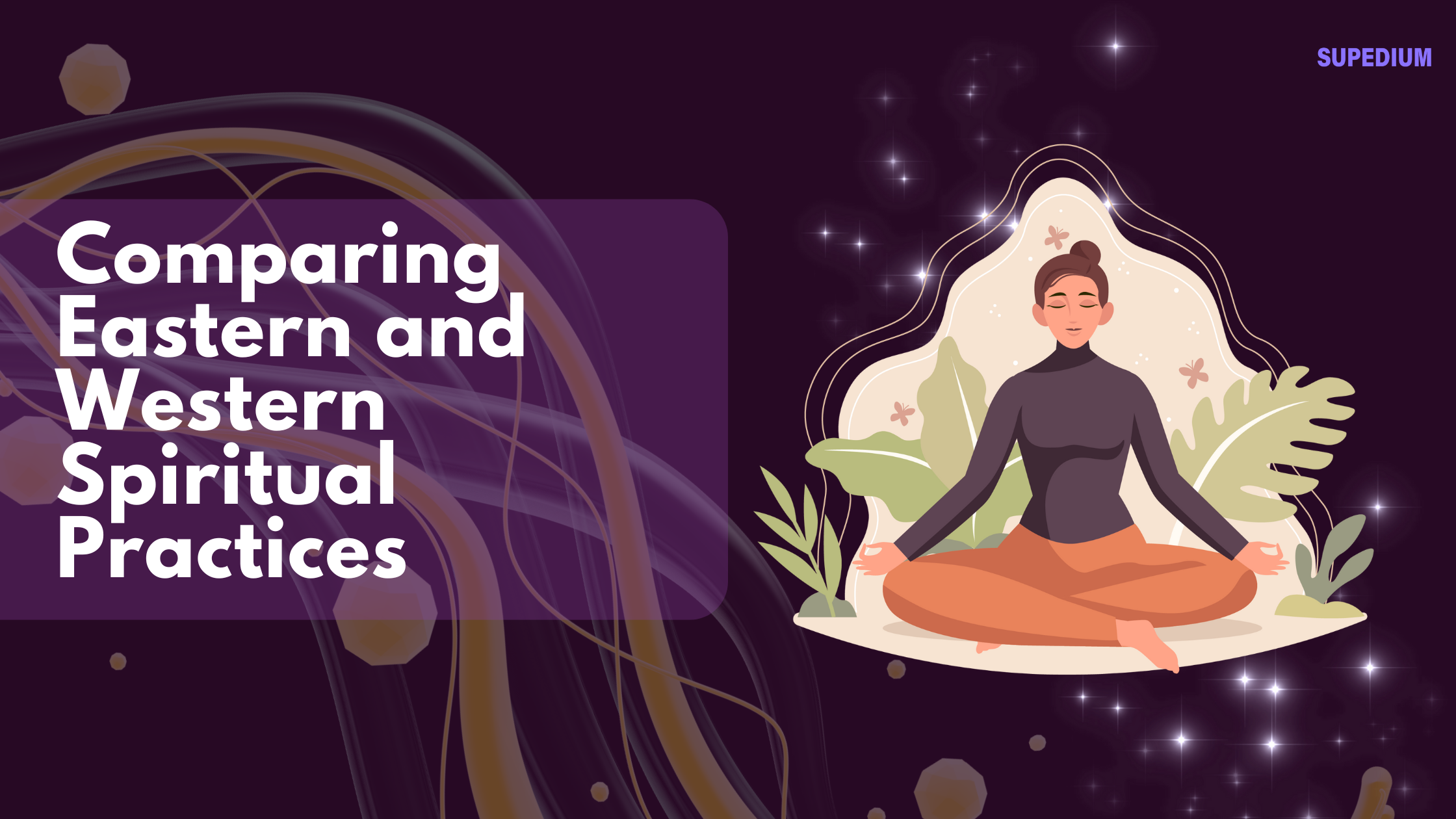Table of Contents
![]()
Introduction
Spiritual practices encompass a wide range of activities aimed at connecting with the divine or achieving personal enlightenment. These practices often involve rituals, meditation, prayer, and ethical living, reflecting the deep-seated beliefs of various cultural traditions. This article explores and compares Eastern and Western spiritual practices, highlighting their historical development, core philosophies, rituals, ethical teachings, goals, and their influence on society and culture.
Historical Context
Eastern Spiritual Practices
Eastern spiritual practices have roots in ancient civilizations and evolved over millennia. Hinduism, one of the oldest religious traditions, began with the Vedic texts around 1500 BCE. These texts laid the foundation for concepts such as Dharma (duty/righteousness), Karma (action and its consequences), and Moksha (liberation from the cycle of rebirth). Buddhism emerged in the 5th century BCE with Siddhartha Gautama (the Buddha) who introduced the Four Noble Truths and the Eightfold Path, focusing on overcoming suffering and attaining Nirvana. Taoism, which originated in China around the 4th century BCE, emphasizes living in harmony with the Tao (the Way) and practicing Wu Wei (non-action).
Western Spiritual Practices
Western spiritual traditions have a rich history shaped by a series of transformative events. Ancient Judaism, with its roots in the Hebrew Bible, laid the groundwork for monotheistic beliefs and covenantal relationships with God. Christianity emerged from Judaism in the 1st century CE, introducing the concept of the Trinity and salvation through Jesus Christ. The Reformation in the 16th century marked a significant shift in Christianity, leading to diverse denominations and interpretations. Islam, founded in the 7th century CE by the Prophet Muhammad, introduced the Five Pillars and emphasized submission to Allah as a path to spiritual fulfillment.
Core Beliefs and Philosophies
Eastern Spiritual Practices
- Hinduism: Central to Hindu belief is the concept of Dharma, which represents duty and righteousness. Karma denotes the principle that one’s actions affect their future lives, and Moksha signifies liberation from the cycle of rebirth. Various paths of yoga, such as Bhakti (devotion), Jnana (knowledge), and Karma (action), provide different approaches to spiritual growth.
- Buddhism: Buddhism is founded on the Four Noble Truths, which diagnose suffering and prescribe the Eightfold Path as a remedy. Enlightenment (Nirvana) is the ultimate goal, representing liberation from the cycle of birth, death, and rebirth. Buddhism emphasizes mindfulness and ethical conduct as means to achieve this state.
- Taoism: Taoism focuses on living in accordance with the Tao, which represents the fundamental nature of the universe. The principle of Wu Wei, or non-action, encourages individuals to act in harmony with the natural flow of life. The balance of Yin and Yang illustrates the interconnectedness and equilibrium in the universe.
Western Spiritual Practices
- Christianity: Christianity is centered on the belief in one God and the Trinity (Father, Son, and Holy Spirit). Salvation, achieved through the grace of God and faith in Jesus Christ, is the primary goal. Key ethical teachings include love for one’s neighbor and the practice of forgiveness.
- Judaism: Judaism emphasizes the covenant between God and the Jewish people, as outlined in the Torah. The ethical framework includes the observance of commandments (mitzvot) and principles such as justice, charity, and holiness. Jewish life is marked by ritual observances and ethical conduct.
- Islam: Islam teaches monotheism and follows the Five Pillars: Shahada (faith), Salah (prayer), Zakat (charity), Sawm (fasting), and Hajj (pilgrimage). The Quran and Hadith (sayings of the Prophet Muhammad) guide ethical behavior and spiritual practice, emphasizing submission to Allah and compassion towards others.
Practices and Rituals
Eastern Practices
- Hinduism: Hindu rituals include Puja (worship) and Yajna (sacrificial offerings), which are performed to honor deities and seek their blessings. Meditation practices, such as chanting mantras and engaging in various forms of yoga, help in spiritual development.
- Buddhism: Buddhist practices include meditation techniques such as Vipassana (insight meditation) and Zen (zazen). Monastic life, with its rigorous discipline, plays a central role in preserving and practicing Buddhist teachings.
- Taoism: Taoist practices include Tai Chi and Qigong, which promote physical health and spiritual harmony. Rituals often focus on aligning with natural forces and maintaining balance in one’s life.
Western Practices
- Christianity: Christian practices involve sacraments such as Baptism and the Eucharist, which are fundamental to the faith. Prayer, worship services (e.g., Mass), and community activities are central to spiritual life.
- Judaism: Jewish practices include daily prayers, observance of the Sabbath (Shabbat), and various rituals associated with life events (e.g., Bar/Bat Mitzvah). Festivals like Passover and Yom Kippur play a significant role in communal and spiritual life.
- Islam: Islamic practices include the performance of five daily prayers, fasting during Ramadan, and giving alms (Zakat). The pilgrimage to Mecca (Hajj) is a significant ritual for Muslims, symbolizing submission to Allah and unity among believers.
Ethical and Moral Teachings
Eastern Ethical Teachings
- Hinduism: Hindu ethics emphasize Ahimsa (non-violence) and Sattva (purity). Ethical living is considered essential for achieving Moksha and maintaining cosmic harmony.
- Buddhism: The Five Precepts provide a moral framework for Buddhists, including principles of non-violence, truthfulness, and abstaining from harmful actions. Ethical conduct is crucial for progress on the path to Nirvana.
- Taoism: Taoist ethics focus on simplicity, humility, and living in harmony with the Tao. The concept of Wu Wei suggests that ethical behavior should flow naturally from understanding and aligning with the Tao.
Western Ethical Teachings
- Christianity: Christian ethics are guided by the Ten Commandments and the teachings of Jesus, which emphasize love, forgiveness, and charity. Ethical living involves following Christ’s example and practicing virtues such as compassion and humility.
- Judaism: Jewish ethics are rooted in the Torah and the mitzvot, which guide behavior towards justice, charity, and community service. Ethical living is integral to maintaining a covenantal relationship with God.
- Islam: Islamic ethics are derived from the Quran and Hadith, emphasizing justice, compassion, and honesty. The ethical teachings guide personal behavior and social interactions, aiming for a just and harmonious society.
Goals and Outcomes
Eastern Goals
- Hinduism: The ultimate goal in Hinduism is Moksha, which represents liberation from the cycle of birth and rebirth. Achieving Moksha involves realizing one’s true self and unity with the divine.
- Buddhism: Nirvana is the goal of Buddhism, representing the cessation of suffering and the end of the cycle of rebirth. Attaining Nirvana involves overcoming desires and attachments.
- Taoism: The goal of Taoism is to live in harmony with the Tao, achieving a balanced and natural existence. This includes aligning oneself with the natural flow of the universe and embracing simplicity.
Western Goals
- Christianity: The primary goal in Christianity is salvation and eternal life with God. This involves faith in Jesus Christ, living according to God’s will, and experiencing divine grace.
- Judaism: The goal in Judaism is to live in accordance with God’s commandments and maintain a covenantal relationship with Him. This includes ethical living and participating in communal and religious life.
- Islam: The goal of Islam is to submit to the will of Allah and attain paradise. This involves following the Five Pillars and living a life of righteousness and devotion.
Comparative Analysis
Commonalities
Both Eastern and Western spiritual practices emphasize moral living and ethical behavior. They share a common goal of personal transformation and spiritual growth, whether through achieving enlightenment, liberation, or salvation.
Differences
The nature of divinity and spiritual goals differ significantly. Eastern traditions often embrace a diverse range of deities and focus on concepts like karma and rebirth, whereas Western traditions generally center on a single, personal God and the pursuit of eternal life. Eastern practices frequently involve meditation and inner development, while Western practices may emphasize faith, ritual observance, and ethical conduct.
Influence on Society and Culture
Eastern Influence
Eastern spiritual practices have profoundly influenced cultural practices and societal values. Festivals, art, and literature often reflect spiritual themes. For example, Hindu festivals like Diwali and Buddhist practices such as meditation retreats have global influence. Modern adaptations of Eastern practices, such as yoga and mindfulness, have become popular worldwide.
Western Influence
Western spiritual practices have similarly shaped cultural norms and societal values. Christian holidays like Christmas and Easter, Jewish celebrations like Hanukkah, and Islamic observances like Ramadan are integral to Western cultural life. The influence of Western spirituality extends into art, literature, and social practices, with ongoing global dialogues about faith and ethics.
Conclusion
Understanding and comparing Eastern and Western spiritual practices reveals both profound similarities and significant differences. This comparative approach fosters greater intercultural respect and dialogue, highlighting the diverse ways humanity seeks meaning and connection with the divine. Continued exploration of these traditions can enrich our appreciation of the world’s spiritual heritage and promote greater mutual understanding.
Share This





Be the first to comment